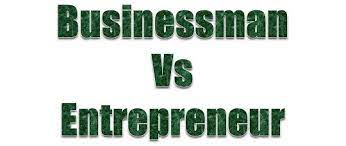Key Differences between Entrepreneur vs Businessman
Do you want to start your own business? Has it always been your ambition to be a successful businessperson? But did you know they’re not the same thing? Do you know the actual difference between entrepreneur vs businessman?
To figure out which one you want to be, you need to know the difference between entrepreneur and businessman/woman. We’ll try to understand what the two phrases mean and look at some examples to show the difference between an entrepreneur and a businessman/woman.
Entrepreneur vs Businessman: Definition
A businessman follows a well-defined road, whereas an entrepreneur believes in forging his own way, which then serves as a model for other entrepreneurs. The majority of people believe that the terms businessman and entrepreneur have the same meaning, thus they use them interchangeably. A businessman is a person who manages a company and pursues an unoriginal business concept. An entrepreneur, on the other hand, is someone who is the first to introduce a product or company idea to the market, making them the market leader.
An entrepreneur eventually becomes a businessman, yet there is a distinction. Even though the terms may appear to be interchangeable to the layperson, there is a distinction between the two in that an entrepreneur is always a market leader, whilst a businessman is a market player. We’ll explain the distinction between a businessman and an entrepreneur in this article.
Entrepreneur vs. Businessman – Characteristics, roles, and responsibilities
A businessman is defined as a person who works in the business world. A businessman is a person who engages in any activity that is related to commercial or industrial purposes. He establishes his company as a new entrant in the market as well as for an existing company. When it comes to the originality of ideas, most businessmen choose a business that is in high demand or can make them a lot of money, regardless of how unique it is. A businessman faces stiff competition because there are already hundreds of competitors in the market doing the same thing.
Although the risk factor is low because he is walking down a path that has already been tested by his competitors, the chances of failure are low. A businessman’s primary goal in undertaking economic activities is to earn revenue through the use of human, financial, and intellectual resources. Customers are considered like kings of business by the businessman as a result of this.

An entrepreneur is someone who comes up with a new idea or concept for a business and turns it into reality. He is the one who shoulders the business’s risks and uncertainties. The entrepreneur’s endeavour is known as a Startup Company, and it is developed for the first time in terms of an idea, innovation, or business method. He or she is the one who always leads the market, regardless of how many competitors arrive later. Their position will remain unchanged. Entrepreneurs are well-known for their innovative thinking. They bring in new ideas and manage resources. They provide products and services that make a difference in the world. The article Key Differences between Entrepreneur vs Businessman doesn’t just end here.
Entrepreneurship and Business
A business is defined as any commercial, professional, or industrial activity that is responsible for supplying goods and services to customers in exchange for a profit. As a result, the term “businessman” refers to someone who is in charge of running a company efficiently and achieving its goals. There are various types of businesses, such as a sole proprietorship, which is a business that is owned and operated only by one person. It is appropriate for a tiny firm.
Partnership – As the name implies, ownership and management responsibilities are shared by two people. Profits and losses are also split equally or according to the terms of the partnership agreement.
Corporation – A corporation is a legal entity apart from its owners or founders. A board of directors shares the duty of running a corporation. The business is in charge of its obligations and assets.
Cooperative Business – A cooperative business is owned equally by a group of individuals or entities who all use the business’s products and services.

The various forms of entrepreneurship ventures are as follows:
Public entrepreneurship– Public entrepreneurship is defined as entrepreneurship that is carried out and sponsored by the government. It aids in the growth of a country’s economy.
Private entrepreneurship– Private entrepreneurship refers to businesses that are founded and run by individuals in the private sector. Governments occasionally provide assistance and funds to encourage more people to start their own enterprises.
Opportunistic Entrepreneurship – Opportunistic entrepreneurship is defined as a type of entrepreneurship that recognises and capitalises on a business opportunity.
Person Entrepreneurship – Individual entrepreneurship is when an individual starts his or her own business.
Acquisitive Entrepreneurship – This refers to taking information from competitors in the market and applying it to create a new way of providing a service or running a firm.
On some important grounds, we may distinguish between the Key Differences between Entrepreneur vs Businessman
Here are a few entrepreneurs who could serve as role models for you
When it comes to the world’s richest man, Jeffrey Preston Bezos is a name that is constantly tossed around. Jeff Bezos founded Amazon, which sells books online and is named after a well-known river in South America. Currently, the firm is a leading e-commerce and retail platform.
Bill Gates
Microsoft was founded in 1975 by Willian Henry Gates, better known as Bill Gates. Gates began investing his time and energy in his interest at the age of 13 and has amassed a fortune of almost US $ 120 billion.
Mark Zuckerberg
Another great example is Mark Zuckerberg. He founded a company that thrives on data and patterns, making him one of our generation’s most forward-thinking business minds. His company, which began with Facebook, now owns a number of social media networks, and his net worth is estimated to be around US $ 101 billion. He is one of the world’s most recent self-made billionaires.
Larry Page
Lawrence Edward Page, also known as Larry Page, is a Google co-founder with a net worth of $78 billion. “Always provide more than expected,” as Larry Page famously said, should be a lesson to all budding businesses.

Few examples of successful businessmen
Mark Zuckerberg
One of the most well-known figures in technology, Mark Zuckerberg, established Facebook as the world’s largest social network. Zuckerberg dropped out of Harvard in his sophomore year of 2004 to work full-time on Facebook, where he is still the CEO today. He is now projected to be worth $86.3 billion.
David Karp
Despite never having graduated from high school, David Karp founded Tumblr (which at its peak had over 500 million monthly users). He left Bronx Science High School in 2001 to be homeschooled, and he never obtained a high school diploma. Instead, he worked his way up via several computer companies before founding Tumblr in 2007. In 2013, Yahoo! purchased the platform for an estimated $800 million.
Pete Cashmore
Pete Cashmore, who created the highly famous blog Mashable at the age of 19, never went to college. Having no college diploma didn’t appear to bother this Scottish entrepreneur, as Mashable was sold to Ziff Davis in 2017 for $50 million, and Cashmore is projected to be worth approximately £90 million after leaving the company in 2018.
Daniel Ek
Daniel Ek co-founded Spotify at the age of 21 after abandoning his engineering degree at the Royal Institute of Technology in Sweden after only eight weeks. The company now has over 217 million subscribers globally, and Ek is worth £4.5 billion, making him the most powerful individual in the music industry.
Understand the difference between an entrepreneur vs businessman
One of the most successful businesswomen is Jean Brownhill Lauer, the creator of Sweeten, a home renovation company. Her education was the key to her achievement, as she came from a financially difficult home. The Perfect Pear Catering Co., owned by Sharon Mickel, is well-known in the United States for its bread puddings and cinnamon buns. Despite the fact that they are created all over the world, she has had tremendous success in her business. Sharon launched her company at a rather late age. A few weeks of culinary school provided the opportunity for the mother of four to discover something she was passionate about. Smart marketing and responding to client feedback were the keys to her success. we hope to give you some perspective on the Key Differences between entrepreneurs vs businessmen to help you in the future.
I hope you liked m article on Key Differences between Entrepreneur vs Businessman informative. Let us know in the comments section below.


